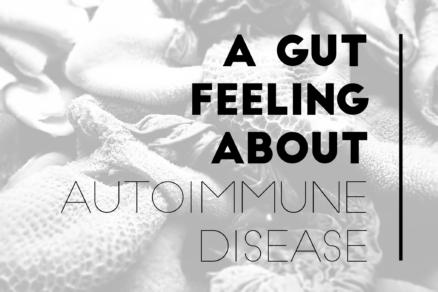When you think of a healthy relationship, you think of both partners benefiting from it. This is what we call a mutual symbiotic relationship and it doesn’t just apply to human-human relationships. Research has shown for decades that there is a mutual symbiotic relationship occurring every day between each of us and our gut. Our gut microbiome is composed of trillions of bacteria that research is showing can have an effect on our immune system, our digestion, our brain, and maybe even more! As long as our gut microbiome is comprised of a good balance of beneficial bacteria then we are golden. We will have fartless digestion, just the right balance of immune function with low inflammation, and we will feel happy and healthy. The crazy part is though, if we have an imbalance in bacteria, or an over growth of pathogenic bacteria (AKA dysbiosis), well then we can be in trouble.
Gut bacteria and Autoimmunity
With the trillions of bugs that we have living around our bodies I don’t even pretend to know all of the consequences dysbiosis on our system! One thing we do know though is that these gut bugs are related to autoimmune (AI) disease. Now you might be wondering what an autoimmune disease is. If you scrape your knee under normal circumstances, your immune system will try to protect you by identifying the foreign invader and getting rid of it. However, with AI disease your immune system thinks your own healthy cells are invaders and will attack them. The state of intestinal dysbiosis in individuals with AI disease is associated with increased inflammation, impaired gut barrier permeability (AKA leaky gut), and decreased bacteria function and diversity.1 AI disease can affect many parts of the body – your brain, nerves, joints, heart, muscles, skin, etc.2 The types of AI diseases they researched in this specific article included type 1 diabetes, multiple sclerosis, rheumatoid arthritis, and systemic lupus erythematosus. Although there is no known cause for the different types of AI diseases, it seems to be strongly linked to an individual’s genetics and environmental factors, which include the gut.2
Gut bacteria and Type 1 Diabetes
First, the researchers from this study looked at the connection between intestinal dysbiosis and Type 1 Diabetes (T1D). T1D occurs when the immune system attacks its own beta cells in the pancreas. These beta cells are responsible for the release of insulin, which reduces the amount of glucose in our blood. Without our pancreas releasing insulin, glucose will build up in our blood instead of being used for energy. Uncontrolled glucose levels can lead to complications such as kidney disease, neuropathy of the feet, eye disease and more.3 Studies performed on rats showed that an increase or decrease in certain bacteria was associated with either pro-inflammatory or anti-inflammatory responses.4 An interesting finding was that an increase in a particular bacteria group, Bacteroidetes, might promote intestinal permeability before clinical signs of T1D are even detected.4 This could mean that those that are genetically predisposed to T1D may be able to go through a screening based of their microbiota composition before the potentially serious side effects of uncontrolled blood glucose levels occur.
Gut bacteria and MS
Next, they looked at multiple sclerosis (MS) and intestinal dysbiosis. MS is an AI disease of the central nervous system, which includes the brain and spinal cord. 5 As in all AI diseases, the immune system attacks self cells. In MS specifically, it attacks the covering of our nerves called myelin. This attack on myelin leads to inflammation and direct damage leading to a disruption in the transmission of nerve signals.5 When studying MS in rats, they found that certain types of bacteria either increased or decreased symptoms.8 When looking at the bacteria specifically, they found that the certain bacteria targeted anti-inflammatory components of the immune system.8 Therefore, researchers may be able to identify which bacteria they should promote the growth of in order to further provide anti-inflammatory effects.
Gut bacteria, RA and SLE
Rheumatoid arthritis (RA) and systemic lupus erythromatosus (SLE) were also investigated in this review. RA is an AI disease where the body’s immune system attacks its own joints.6 SLE is an AI disease where the body’s immune system attacks multiple organs as well as joints and skin.7 Similar to the previous AI diseases discussed, gut microbiota modulation may slow or advance disease progression.
Overall, although a lot of the studies up to this point have been done in animals, more and more research is showing similar findings in humans. In fact, one group, called UBiome is doing a ton of great research currently, getting people to sample not only their gut microbiome, but bug populations all over their body. There is no doubt in my mind they will further support these connections between bugs and autoimmunity and that treating our bugs, and not diseases, will be the medicine of the future!
That may have been a lot to take in, but your next question is probably “what can I do now”?
The first thing is to take stock of your gut.
Negative influences
Have you been on a lot of anti-biotics?
Have you ever had a gut infection, food poisoning etc?
Do you have symptoms of inflammation, bloating, gas, constipation or diarrhea?
Do you have a family history of autoimmune diseases? (Lupus, RA, MS, celiac, Crohn’s disease, hashimotos thyroiditis)
You may want to consider testing your microbiome.
Positive Influences
Do you eat enough fiber (the recommended dose is 30-50g per day)?
Are you eating plenty of colourful vegetables and fruits?
Do you consume fermented foods regularly?
Are you free from negative influences?
Gut testing may not be as relevant to you.
No matter where you sit on the spectrum it is critically important to be working on the health of your gastrointestinal tract to both prevent or treat inflammation and other autoimmune conditions.
References
- https://www.ncbi.nlm.nih.gov/pmc/articles/PMC3337124/
- https://www.niams.nih.gov/Health_info/Autoimmune/default.asp
- http://www.diabetes.ca/about-diabetes/types-of-diabetes
- https://www.ncbi.nlm.nih.gov/pubmed/15861021
- https://mssociety.ca/about-ms/what-is-ms
- http://www.arthritis.org/about-arthritis/types/rheumatoid-arthritis/what-is-rheumatoid-arthritis.php
- https://www.rheumatology.org/i-am-a/patient-caregiver/diseases-conditions/lupus
- https://www.ncbi.nlm.nih.gov/pubmed/19841183

